Kathleen Siminyu
Towards Best Practices for Open Datasets for LLM Training
Jan 14, 2025Abstract:Many AI companies are training their large language models (LLMs) on data without the permission of the copyright owners. The permissibility of doing so varies by jurisdiction: in countries like the EU and Japan, this is allowed under certain restrictions, while in the United States, the legal landscape is more ambiguous. Regardless of the legal status, concerns from creative producers have led to several high-profile copyright lawsuits, and the threat of litigation is commonly cited as a reason for the recent trend towards minimizing the information shared about training datasets by both corporate and public interest actors. This trend in limiting data information causes harm by hindering transparency, accountability, and innovation in the broader ecosystem by denying researchers, auditors, and impacted individuals access to the information needed to understand AI models. While this could be mitigated by training language models on open access and public domain data, at the time of writing, there are no such models (trained at a meaningful scale) due to the substantial technical and sociological challenges in assembling the necessary corpus. These challenges include incomplete and unreliable metadata, the cost and complexity of digitizing physical records, and the diverse set of legal and technical skills required to ensure relevance and responsibility in a quickly changing landscape. Building towards a future where AI systems can be trained on openly licensed data that is responsibly curated and governed requires collaboration across legal, technical, and policy domains, along with investments in metadata standards, digitization, and fostering a culture of openness.
AI4D -- African Language Program
Apr 06, 2021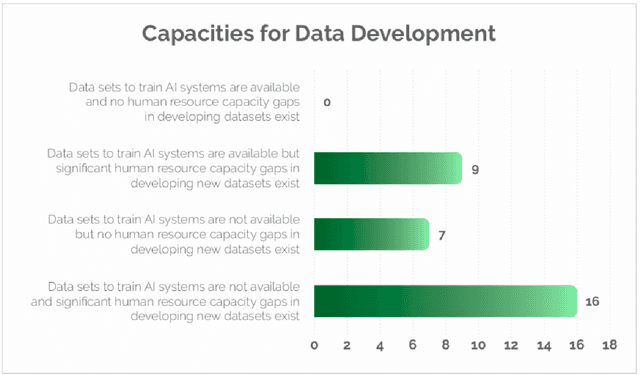
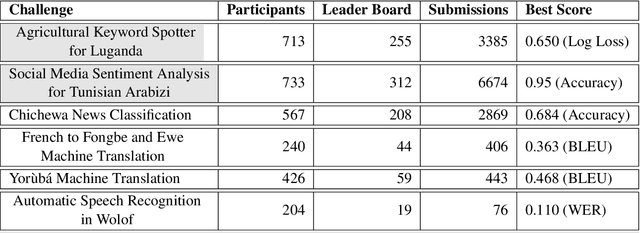
Abstract:Advances in speech and language technologies enable tools such as voice-search, text-to-speech, speech recognition and machine translation. These are however only available for high resource languages like English, French or Chinese. Without foundational digital resources for African languages, which are considered low-resource in the digital context, these advanced tools remain out of reach. This work details the AI4D - African Language Program, a 3-part project that 1) incentivised the crowd-sourcing, collection and curation of language datasets through an online quantitative and qualitative challenge, 2) supported research fellows for a period of 3-4 months to create datasets annotated for NLP tasks, and 3) hosted competitive Machine Learning challenges on the basis of these datasets. Key outcomes of the work so far include 1) the creation of 9+ open source, African language datasets annotated for a variety of ML tasks, and 2) the creation of baseline models for these datasets through hosting of competitive ML challenges.
Phoneme Recognition through Fine Tuning of Phonetic Representations: a Case Study on Luhya Language Varieties
Apr 04, 2021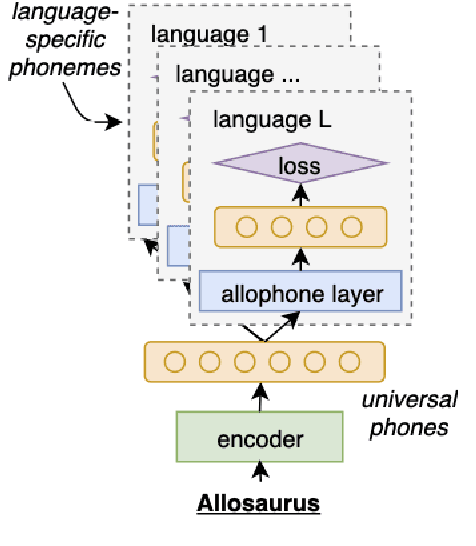
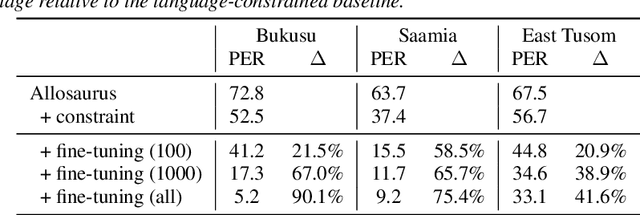
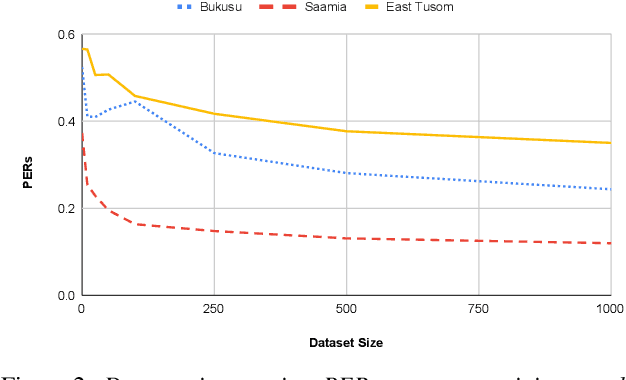
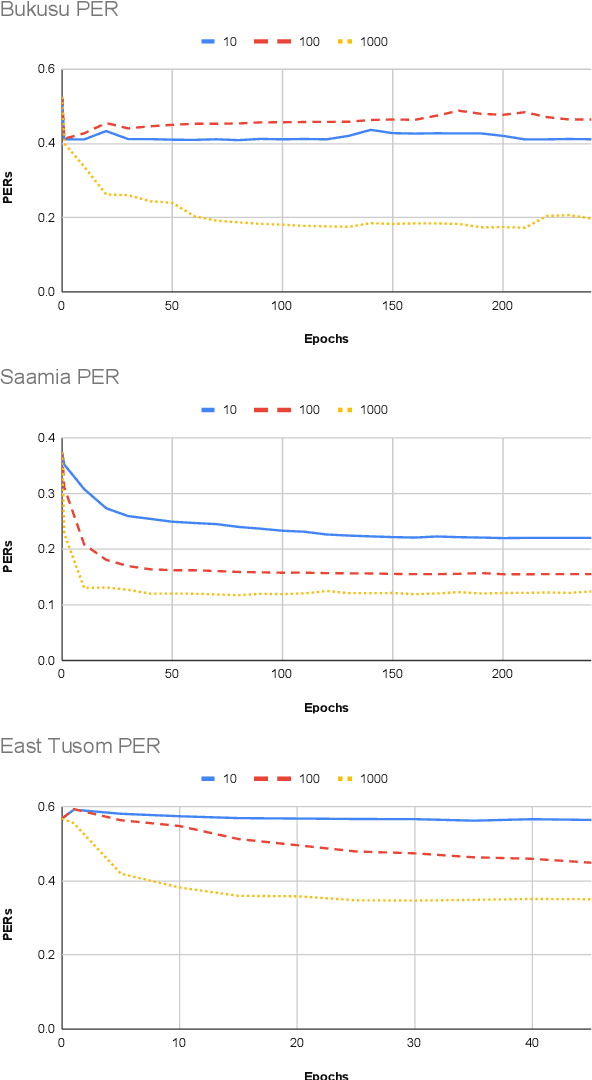
Abstract:Models pre-trained on multiple languages have shown significant promise for improving speech recognition, particularly for low-resource languages. In this work, we focus on phoneme recognition using Allosaurus, a method for multilingual recognition based on phonetic annotation, which incorporates phonological knowledge through a language-dependent allophone layer that associates a universal narrow phone-set with the phonemes that appear in each language. To evaluate in a challenging real-world scenario, we curate phone recognition datasets for Bukusu and Saamia, two varieties of the Luhya language cluster of western Kenya and eastern Uganda. To our knowledge, these datasets are the first of their kind. We carry out similar experiments on the dataset of an endangered Tangkhulic language, East Tusom, a Tibeto-Burman language variety spoken mostly in India. We explore both zero-shot and few-shot recognition by fine-tuning using datasets of varying sizes (10 to 1000 utterances). We find that fine-tuning of Allosaurus, even with just 100 utterances, leads to significant improvements in phone error rates.
Tusom2021: A Phonetically Transcribed Speech Dataset from an Endangered Language for Universal Phone Recognition Experiments
Apr 02, 2021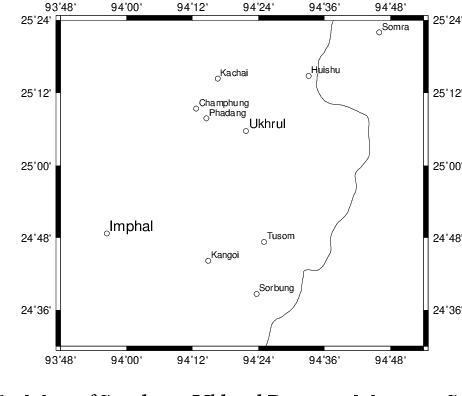
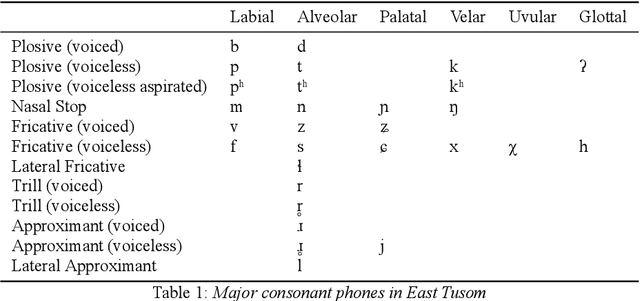
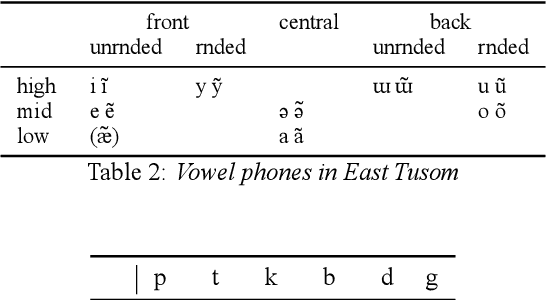
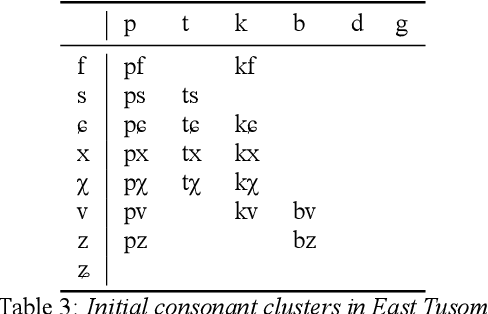
Abstract:There is growing interest in ASR systems that can recognize phones in a language-independent fashion. There is additionally interest in building language technologies for low-resource and endangered languages. However, there is a paucity of realistic data that can be used to test such systems and technologies. This paper presents a publicly available, phonetically transcribed corpus of 2255 utterances (words and short phrases) in the endangered Tangkhulic language East Tusom (no ISO 639-3 code), a Tibeto-Burman language variety spoken mostly in India. Because the dataset is transcribed in terms of phones, rather than phonemes, it is a better match for universal phone recognition systems than many larger (phonemically transcribed) datasets. This paper describes the dataset and the methodology used to produce it. It further presents basic benchmarks of state-of-the-art universal phone recognition systems on the dataset as baselines for future experiments.
1st AfricaNLP Workshop Proceedings, 2020
Nov 20, 2020Abstract:Proceedings of the 1st AfricaNLP Workshop held on 26th April alongside ICLR 2020, Virtual Conference, Formerly Addis Ababa Ethiopia.
Participatory Research for Low-resourced Machine Translation: A Case Study in African Languages
Oct 05, 2020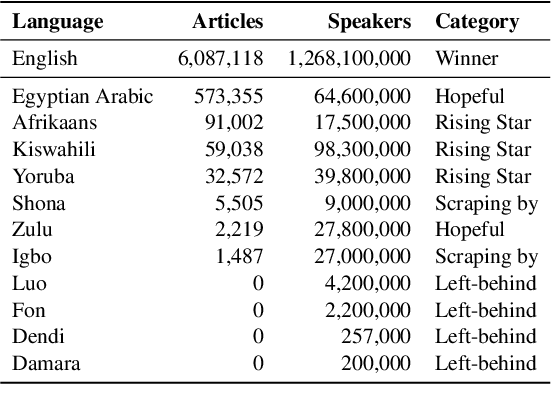
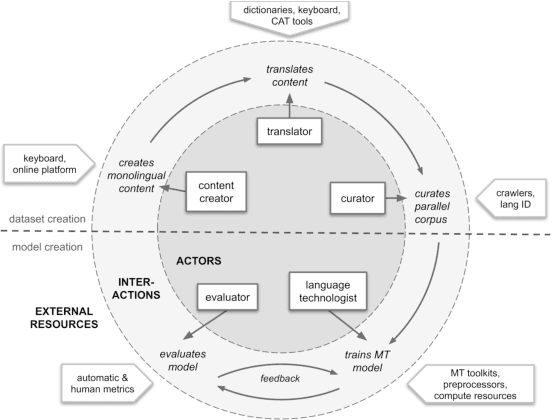
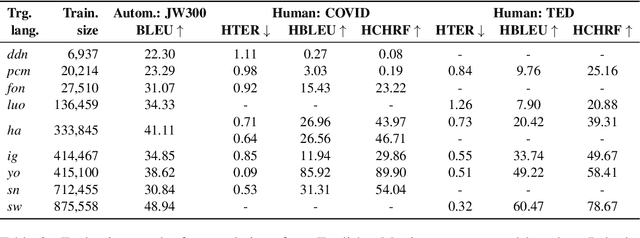
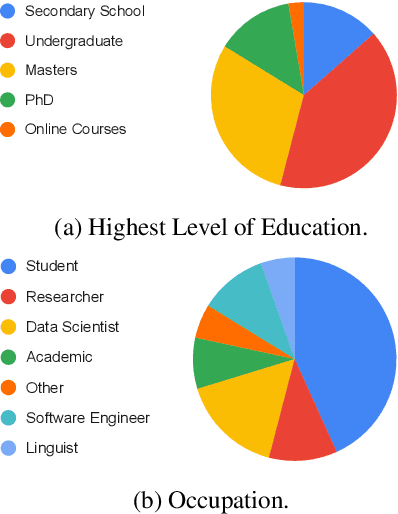
Abstract:Research in NLP lacks geographic diversity, and the question of how NLP can be scaled to low-resourced languages has not yet been adequately solved. "Low-resourced"-ness is a complex problem going beyond data availability and reflects systemic problems in society. In this paper, we focus on the task of Machine Translation (MT), that plays a crucial role for information accessibility and communication worldwide. Despite immense improvements in MT over the past decade, MT is centered around a few high-resourced languages. As MT researchers cannot solve the problem of low-resourcedness alone, we propose participatory research as a means to involve all necessary agents required in the MT development process. We demonstrate the feasibility and scalability of participatory research with a case study on MT for African languages. Its implementation leads to a collection of novel translation datasets, MT benchmarks for over 30 languages, with human evaluations for a third of them, and enables participants without formal training to make a unique scientific contribution. Benchmarks, models, data, code, and evaluation results are released under https://github.com/masakhane-io/masakhane-mt.
AI4D -- African Language Dataset Challenge
Jul 23, 2020
Abstract:As language and speech technologies become more advanced, the lack of fundamental digital resources for African languages, such as data, spell checkers and Part of Speech taggers, means that the digital divide between these languages and others keeps growing. This work details the organisation of the AI4D - African Language Dataset Challenge, an effort to incentivize the creation, organization and discovery of African language datasets through a competitive challenge. We particularly encouraged the submission of annotated datasets which can be used for training task-specific supervised machine learning models.
Masakhane -- Machine Translation For Africa
Mar 13, 2020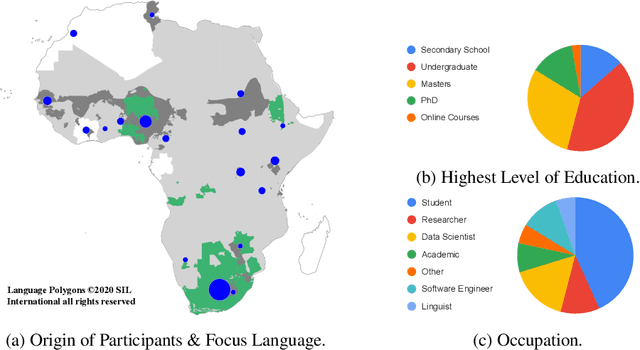
Abstract:Africa has over 2000 languages. Despite this, African languages account for a small portion of available resources and publications in Natural Language Processing (NLP). This is due to multiple factors, including: a lack of focus from government and funding, discoverability, a lack of community, sheer language complexity, difficulty in reproducing papers and no benchmarks to compare techniques. To begin to address the identified problems, MASAKHANE, an open-source, continent-wide, distributed, online research effort for machine translation for African languages, was founded. In this paper, we discuss our methodology for building the community and spurring research from the African continent, as well as outline the success of the community in terms of addressing the identified problems affecting African NLP.
 Add to Chrome
Add to Chrome Add to Firefox
Add to Firefox Add to Edge
Add to Edge